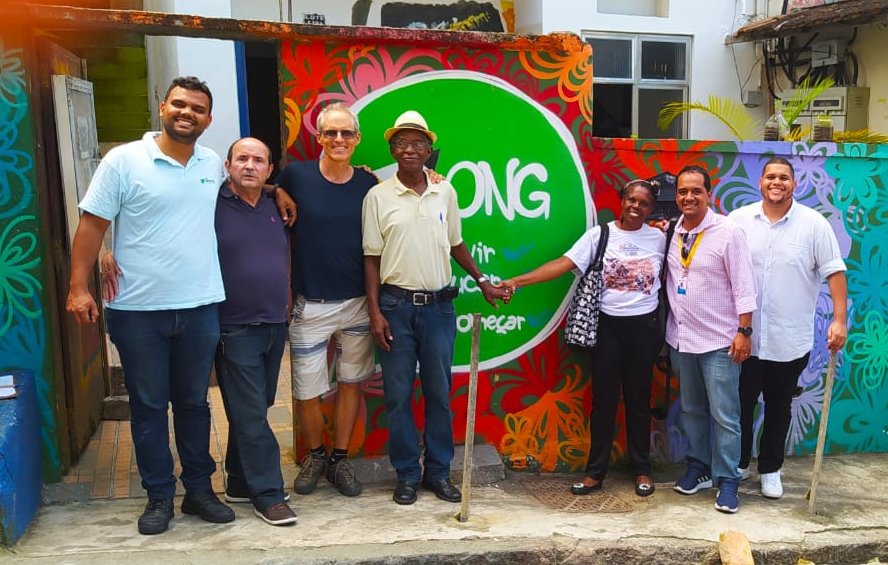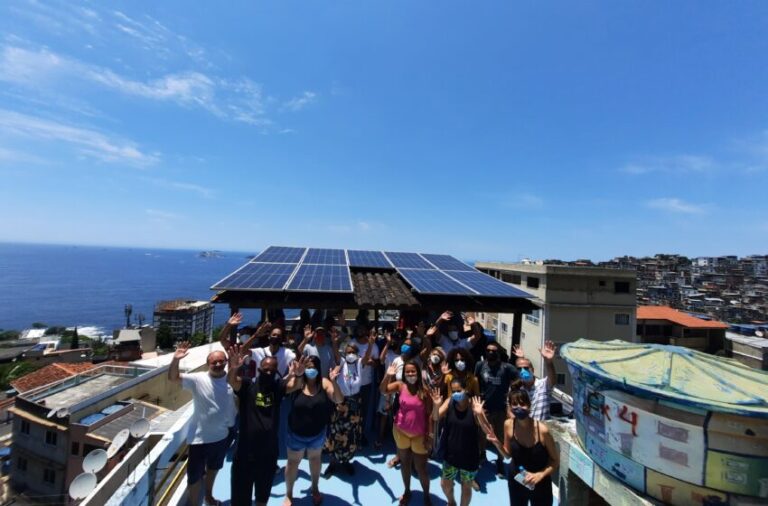

This is our latest article in a series created in partnership with the Behner Stiefel Center for Brazilian Studies at San Diego State University, to produce articles for the Digital Brazil Project on climate impacts and affirmative action in the favelas for RioOnWatch.
Educate to transform. This is the motto of community-based organization Ser Alzira de Aleluia, which operates in the favela of Vidigal, in Rio de Janeiro’s South Zone. The history of the institution is intertwined with the history of the family of Antônio Carlos de Aleluia, today a PhD in Ocean Engineering and university professor. Education has always been a very important value to the family, which arrived in Vidigal at the end of the 1940s. Alzira de Aleluia was Antônio Carlos’ grandmother’s name, and is also the name of the organization, which serves around 120 children with various activities offered to the community.

Antônio Carlos, better known as Toninho do Vidigal, first sought to create a reference project for young people and adults during his youth. He became known in the community for being the favela’s first young black resident to enroll in the mechanical engineering course at the Fluminense Federal University (UFF) in 1975. In March 2003, he and his wife turned their dream into reality, founding the NGO Ser Alzira de Aleluia. Today, the organization offers a preparatory course for students who want to enter technical school or university, and tutoring, in addition to languages, computer science, dance, and sports classes. The project also has activities aimed at the community’s adults and seniors.
So far, at least five young people from Vidigal have enrolled in undergraduate courses at Rio’s Catholic University (PUC) through Ser Alzira’s college exam preparatory course, which has been in operation since 2016. Antônio and Elma de Aleluia, co-founder and current president of the organization, seek to expand opportunities for favela residents through partnerships with external organizations and companies. This model allows the institution to offer scholarships for language courses, donations of school materials and baskets of basic foodstuffs in addition to facilitating the presence of residents at cultural presentations and events.

Networking and dialogue with other organizations are the basis for the institution to maintain its activities in the area. As Elma de Aleluia says: “these partnerships generate the sustainability needed for us to continue with our activities. It is because of them that we grow and can continue to serve the community.”
Among the pressures on the NGO is financial sustainability, a common challenge for social and community institutions. After a few years of searching for partnerships to make viable the installation of solar panels whose savings will be a boon to achieving financial sustainability, in December 2021 Ser Alzira de Aleluia received the support necessary. Saving on the electric bill is a major objective of the solar energy system, which also plays an important role in the training and environmental education of residents. Ser Alzira now hosts the first photovoltaic module in Vidigal.
Elma explains that there was a great desire on the part of the team to model new energy distribution possibilities to residents, beyond simply benefiting through redirecting the resources previously spent on electricity toward the purchase of materials for educational activities. “We are seeing great savings with solar energy because our bill was previously very high. We now pay R$200 or R$300 reais (US$39 or US$58), depending on the month,” she explains. In the past, the project’s electricity bill was around R$700 (US$136), representing a reduction of over 50%. The amount saved has been used to pay for Internet access, telephone, and office supplies. “The savings on the bill help keep the institution running, not in the least because the Internet is essential for our work,” she says.

Clean and Sustainable Energy in Vidigal
Solar energy projects already exist in other favelas in Rio’s South Zone, such as Chapéu Mangueira and Babilônia, both in Leme, and Santa Marta, in Botafogo. The systems installed in these areas demonstrate that solar energy is not only possible, but also desirable in favelas, areas with great potential for generating this type of energy. Implementation does, however, face a few challenges, such as the cost of equipment, the need for roofing that supports the weight of solar panels, and the proper functioning of the regular energy system, supplied by local power utility Light.
The solar energy system works in an integrated way with the regular electrical grid. The energy captured by the photovoltaic modules, as the panels are called, goes into the network where the system is installed. Some of this energy is used by electrical appliances that are turned on at the time. The surplus enters the power utility’s network, where it is redistributed. All the energy generated translates into discounts in the electric bill.
The equipment installed at Ser Alzira was donated by a solar energy company. The opportunity came through Hans Rauschmayer, a local expert on solar energy and founder of Solarize Training, and technical ally member the Sustainable Favela Network’s (SFN)* Energy Justice Working Group. The connection between the opportunity and Vidigal’s social project came about through SFN.

“Thiago [Fraga] brought me the proposal [for the system] donation. I decided to take it to the Sustainable Favela Network’s Solar Energy Working Group [now the Energy Justice Working Group],” recalled Rauschmayer. Thiago Fraga is the organizer of the Southeast Distributed Energy Forum and was the person responsible for directing the joint donation from PHB Solar and Grupo FRG. In addition to these, other institutions also contributed. Solfortes contributed to the installation and official approval of the system, and Mirassol Energia Solar donated materials for the construction work. Solarize planned and participated in the installation, as well as in training a local resident to build and maintain the system.
On choosing the Ser Alzira project, Rauschmayer continues: “we evaluated a few candidates in the Working Group and decided together to take the system to Vidigal, since Dona Elma had been with us for a long time and had the best [structural] conditions at the time,” he explains. The Sustainable Favela Network, an initiative in which both Elma de Aleluia and Rauschmayer participate, brings together over 120 projects that realize social solutions and sustainability in favelas.
The installation of the Ser Alzira photovoltaic system is intended to be a first step. In addition to inspiring other institutions and the residents themselves, the idea is to think of ways to make technical courses for installing solar panels feasible, as has happened in other favelas. Thus, there would be people in the community capable of carrying out maintenance and new installations inside and outside the area. For this dream to come true, however, it is necessary to obtain resources to make the course cheaper or free of charge to the residents of Vidigal.

For the installation of the system in early December of last year, Ser Alzira had to assemble a task force to complete the structural adjustments to the roof of the organization’s headquarters. In all, 20 people from five favelas and the formal city were involved in executing and delivering the finalized work ten days before the system was launched, which took place on December 5, 2021. Elma de Aleluia reflects on the social impacts of the system:
“Distributed energy through solar energy educates us to be citizens, to save, to recycle, to distribute what is left over, passing it on to a partner.” — Elma de Aleluia
The production of electricity through the sun’s energy does not generate polluting gas emissions. That is why it is called clean energy. Solar energy is also a type of renewable energy, as it does not originate from finite resources. It is, therefore, a type of energy seen as allied to the environment and not harmful to human health. Little by little, this type of generation has become popular in the favelas of Rio de Janeiro through training of residents, low-cost installations and, also, because of the environmental education work of collectives and community leaders.
Ser Alzira de Aleluia knows the positive aspects of receiving solar energy and is already planning the system’s future expansion. The dream is to build a photovoltaic solar plant in Vidigal. The goal seems ambitious, but projects like this are already being developed in nearby favelas such as Babilônia, in Leme.
“We have the courage and daring to contemplate a power plant to serve as many people as we can in the favela. We are getting ready, because laws are being drafted to benefit small-scale plants and, in this way, who knows, we can serve our community. That’s the goal in a few years.” — Elma de Aleluia

Current Challenges
In the last two years, favelas have been greatly impacted by the consequences of the coronavirus pandemic. The health crisis has also become a social crisis in these territories, with job losses, reductions of income, limited access to education, and damage to mental health. During this period, the Ser Alzira de Aleluia project saw the demand for help grow rapidly in the community. All of a sudden, educational activities had to migrate to the virtual environment and other activities were suspended. Last year alone, 3,800 baskets of basic foodstuffs were donated in Vidigal. This year, the project still has a list of about 1,300 families registered to receive food donations.
The large donation made in 2021 was the result of donations from various institutions throughout Brazil. This year, however, the president of the NGO does not know if she will be able to obtain donations for the 1,000 awaiting families. So far, there is no prediction as to whether new food baskets will arrive.

Founded 19 years ago, Ser Alzira has always been supported by friends and external donors. At the institution’s headquarters, at the top of Vidigal, there is also a hostel. The place hosts tourists from several countries and the profits are directed to the NGO’s social projects. The pandemic, however, also greatly impacted the financial return of “Alzira House.” Before, the place hosted an average of twelve people, but since the arrival of the novel coronavirus, the number decreased by half.
“The organization has been around for 19 years, with its own headquarters, operating inside the favela and surviving on donations. I feel that the government ignores projects like ours, projects that are working on education and the environment inside favelas… We see the needs of the families. Often, a mother or father has to work, and they drop the children off at schools and daycare centers. Or the father leaves and the mother or grandmother has to support the children [and/or grandchildren] alone. It is with these people that we work. I think the public authorities work in a very palliative way, and we work at the base.” — Elma de Aleluia
The institution is open to receiving food donations, cleaning products, and school supplies. Elma de Aleluia also says that it would be very important for the project to get a car. The NGO has a vehicle, but it has been in use for over 20 years and needs to be restored or replaced to meet the needs of the initiative. With the help of volunteers, donors and friends, Ser Alzira continues to make a difference in the lives of Vidigal residents.
*The Sustainable Favela Network and RioOnWatch are both projects of Catalytic Communities (CatComm).
About the author: Born and raised in Vilar dos Teles, São João de Meriti, Beatriz Carvalho is a journalist, media-activist, feminist, and founder of Mulheres de Frente.
